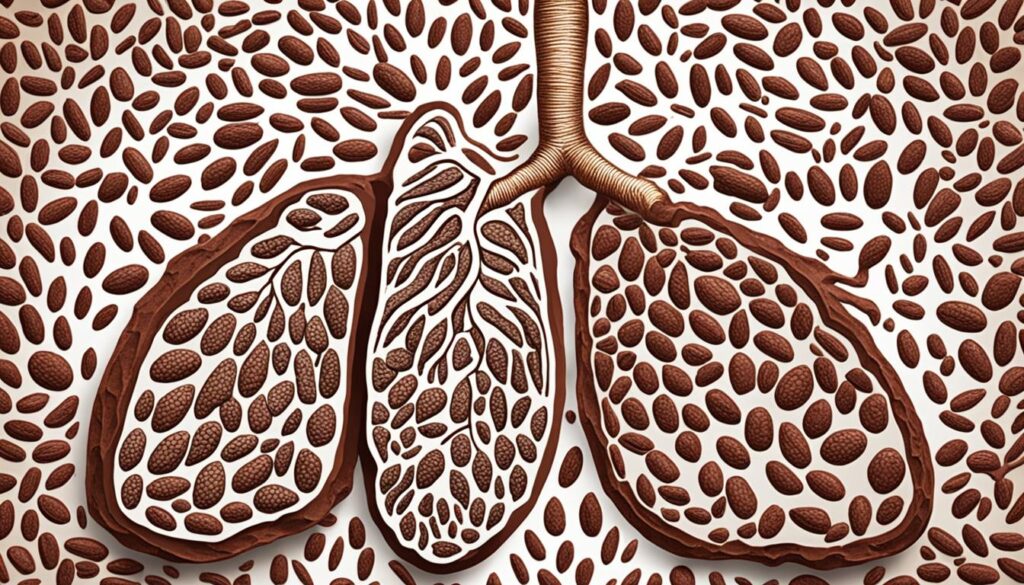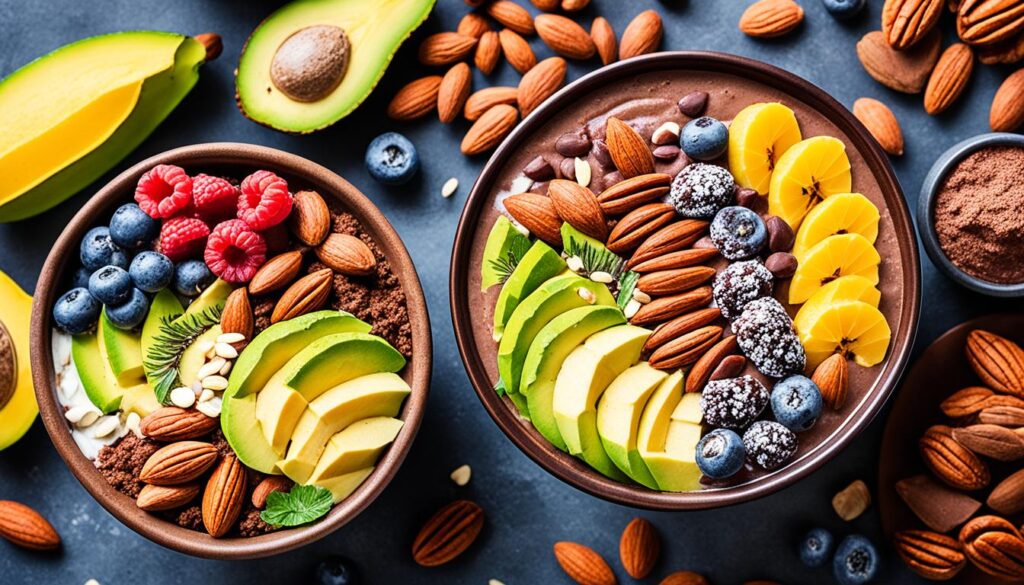Cocoa, the key ingredient in chocolate, has been the subject of increasing research on its potential health benefits, including its impact on respiratory health. This article will explore the scientific evidence on how cocoa consumption can influence various aspects of respiratory function, such as lung capacity, inflammation, and susceptibility to respiratory infections. It will also discuss the potential mechanisms by which cocoa may exert these effects and provide guidance on incorporating cocoa into a healthy lifestyle for optimal respiratory benefits.
Key Takeaways
- Cocoa is a rich source of antioxidants and anti-inflammatory compounds that may benefit respiratory health.
- Studies suggest that cocoa can improve lung function, reduce airway inflammation, and potentially enhance immunity against respiratory infections.
- Incorporating cocoa into a balanced diet and healthy lifestyle can contribute to overall respiratory well-being.
- Choosing high-quality cocoa products and understanding their processing methods can ensure maximum health benefits.
- Exploring creative ways to incorporate cocoa into your diet, such as in snacks, beverages, and savory dishes, can make it a delicious and effective part of your respiratory health regimen.
Introduction to Cocoa and Respiratory Health
The relationship between diet and respiratory health has been a topic of growing interest in the scientific community. Certain nutrients and food compounds have been found to influence various aspects of respiratory function, including lung capacity, airway inflammation, and susceptibility to respiratory infections. Cocoa, a rich source of antioxidants and other bioactive compounds, has emerged as a potential dietary intervention that may positively impact respiratory health.
Understanding the Link Between Diet and Respiratory Function
Researchers have long recognized the importance of how diet affects lung function. Certain dietary factors, such as the intake of antioxidants, anti-inflammatory compounds, and essential nutrients, can play a significant role in maintaining optimal respiratory health. By understanding this link between diet and respiratory health, healthcare professionals and individuals can explore targeted dietary strategies to support respiratory well-being.
The Potential Benefits of Cocoa for Respiratory Health
Cocoa, the key ingredient in chocolate, has gained attention for its potential to offer benefits for respiratory health. The unique nutritional profile of cocoa, particularly its high concentration of antioxidants and anti-inflammatory compounds, suggests that it may have a positive impact on various aspects of respiratory function. As researchers continue to explore the potential benefits of cocoa for respiratory health, the scientific community is gaining a better understanding of how this versatile food compound can be incorporated into a healthy lifestyle to support respiratory well-being.
The Nutritional Profile of Cocoa

Cocoa, the key ingredient in chocolate, is a complex food with a unique nutritional profile that may contribute to its potential respiratory health benefits. It is a rich source of polyphenols, particularly flavanols, which are potent antioxidants. These compounds have been shown to possess anti-inflammatory properties, which can be particularly beneficial for respiratory conditions characterized by airway inflammation, such as asthma and COPD.
Antioxidants and Anti-inflammatory Compounds in Cocoa
The antioxidant and anti-inflammatory properties of cocoa are attributed to its diverse array of bioactive compounds, including flavanols, procyanidins, theobromine, and methylxanthines. These compounds have been extensively studied for their potential to reduce oxidative stress and modulate inflammatory pathways in the body, which can have a positive impact on respiratory health.
| Key Compounds in Cocoa | Potential Benefits for Respiratory Health |
|---|---|
| Flavanols | Potent antioxidants that can help reduce airway inflammation and improve lung function |
| Procyanidins | Anti-inflammatory properties that may alleviate symptoms of respiratory conditions like asthma |
| Theobromine | Potential bronchodilator effects that can improve airflow and breathing |
| Methylxanthines | Stimulant properties that may enhance respiratory muscle function and reduce fatigue |
The nutritional profile of cocoa, with its abundance of antioxidants and anti-inflammatory compounds, suggests that it may be a valuable addition to a healthy lifestyle for individuals seeking to support their respiratory health.
Cocoa and Lung Function

One of the primary ways in which cocoa may benefit respiratory health is by positively influencing lung function and reducing airway inflammation. Studies have suggested that the antioxidant and anti-inflammatory properties of cocoa compounds can help improve lung capacity, airflow, and overall respiratory function.
The Impact of Cocoa on Airway Inflammation
The anti-inflammatory properties of cocoa have been extensively studied in the context of respiratory health. Compounds like flavanols found in cocoa possess the ability to modulate inflammatory pathways, potentially leading to decreased airway inflammation. This reduction in inflammation can have a positive impact on lung function, making breathing easier and improving overall respiratory well-being.
Cocoa and Asthma Management
Emerging research has also explored the potential benefits of cocoa consumption for individuals with asthma. The anti-inflammatory effects of cocoa compounds may help alleviate asthma symptoms, such as wheezing, chest tightness, and difficulty breathing. Additionally, the antioxidant properties of cocoa may contribute to improved lung function and better asthma management.
| Effect of Cocoa | Potential Benefits |
|---|---|
| Improved Lung Function | Increased lung capacity, better airflow, and enhanced overall respiratory function |
| Reduced Airway Inflammation | Decreased inflammation in the airways, leading to easier breathing and reduced asthma symptoms |
| Enhanced Asthma Management | Improved control of asthma symptoms and better overall respiratory health |
Cocoa and Respiratory Infections

In addition to its potential benefits for lung function and respiratory inflammation, cocoa may also play a role in reducing the risk and severity of respiratory infections. The antimicrobial properties of certain cocoa compounds, such as flavanols and methylxanthines, have been explored for their ability to inhibit the growth and proliferation of respiratory pathogens.
The Antimicrobial Properties of Cocoa
Numerous studies have investigated the antimicrobial properties of cocoa and its potential to combat respiratory infections. Cocoa’s antimicrobial effects are primarily attributed to its high content of polyphenols, particularly flavanols, which have been shown to exhibit antibacterial, antiviral, and antifungal activities. These compounds can interfere with the growth and replication of various respiratory pathogens, including bacteria, viruses, and fungi, making cocoa a promising natural option for supporting respiratory health.
Cocoa’s Potential Role in Boosting Immunity
In addition to its antimicrobial properties, cocoa may also boost the body’s immune response to respiratory infections. The antioxidant and anti-inflammatory compounds in cocoa have been linked to enhanced immune function, which can help the body more effectively fight off respiratory pathogens. By supporting the immune system, regular cocoa consumption may contribute to a reduced risk and severity of respiratory infections, such as the common cold, influenza, and COVID-19.
| Antimicrobial Properties of Cocoa | Immune-Boosting Effects of Cocoa |
|---|---|
|
|
How does cocoa consumption affect respiratory health?

The scientific evidence on the impact of cocoa consumption on respiratory health is extensive and promising. Numerous studies, both observational and interventional, have explored the mechanisms by which cocoa can positively influence various aspects of respiratory function and overall respiratory well-being.
Exploring the Scientific Evidence
One of the key ways in which cocoa may benefit respiratory health is through its antioxidant and anti-inflammatory properties. The high concentration of flavanols, a class of polyphenols found in cocoa, has been shown to have a profound effect on lung function and airway inflammation. Studies have demonstrated that regular cocoa consumption can improve lung capacity, enhance airflow, and reduce markers of inflammation in the respiratory system. These benefits are particularly relevant for individuals with respiratory conditions such as asthma and chronic obstructive pulmonary disease (COPD).
Additionally, the antimicrobial and immune-boosting properties of cocoa compounds have been investigated for their potential to reduce the risk and severity of respiratory infections. Research has indicated that certain bioactive compounds in cocoa, such as methylxanthines, can inhibit the growth and proliferation of respiratory pathogens, potentially enhancing the body’s ability to fight off infectious threats.
Recommended Intake for Optimal Respiratory Benefits
While the specific recommended intake of cocoa for optimal respiratory health benefits may vary based on individual factors and the severity of respiratory conditions, general guidelines suggest that incorporating moderate amounts of high-quality cocoa into a balanced diet can be beneficial. Most studies have found that consuming 20-30 grams of cocoa per day, either in the form of dark chocolate or cocoa powder, can contribute to improved lung function and reduced airway inflammation. However, it is essential to consult with a healthcare professional to determine the appropriate intake level for your specific needs and to ensure that cocoa consumption does not interfere with any existing medical treatments or conditions.
Cocoa and Chronic Obstructive Pulmonary Disease (COPD)

Chronic Obstructive Pulmonary Disease (COPD) is a progressive respiratory condition that can significantly impact lung function and quality of life. Emerging research suggests that cocoa consumption may have a beneficial impact on COPD management and symptom alleviation.
The Effects of Cocoa on COPD Symptoms
Several studies have explored the potential benefits of cocoa and COPD. The antioxidant and anti-inflammatory properties of cocoa compounds, such as flavanols, may help to reduce airway inflammation and improve respiratory function in individuals with COPD. One study found that regular consumption of flavonol-rich cocoa was associated with improvements in endothelial function and reduced oxidative stress in patients with COPD, potentially contributing to better overall respiratory health.
Furthermore, the potential effects of cocoa on COPD symptoms have been highlighted in other research. A study published in the International Journal of COPD suggested that dark chocolate consumption may help to modestly lower blood pressure in individuals with COPD, which can be a common comorbidity. This could have implications for managing COPD-related complications and improving overall cardiovascular health in this patient population.
While the existing evidence is promising, it is important to note that the research on cocoa and COPD is still emerging, and more extensive studies are needed to fully understand the long-term effects and optimal cocoa intake for COPD management. Nevertheless, incorporating cocoa, particularly dark chocolate, into a balanced diet may be a simple and potentially beneficial dietary strategy for individuals living with COPD.
Cocoa and Respiratory Health: A Holistic Perspective

While the potential benefits of cocoa for respiratory health are compelling, it is essential to consider a holistic approach to maintaining overall respiratory well-being. This section discusses the importance of incorporating cocoa consumption into a broader healthy lifestyle, including factors such as a balanced diet, regular physical activity, and avoidance of respiratory irritants.
Incorporating Cocoa into a Healthy Lifestyle
To maximize the respiratory health benefits of cocoa, it should be incorporated into an overall healthy lifestyle. This includes consuming a balanced diet rich in a variety of fruits, vegetables, whole grains, and lean protein sources. Regular physical activity, such as moderate-intensity exercises like walking, swimming, or yoga, can also help improve lung function and respiratory fitness.
In addition to dietary and lifestyle factors, it is important to avoid or minimize exposure to respiratory irritants, such as cigarette smoke, air pollution, and certain household chemicals. These environmental factors can exacerbate respiratory conditions and undermine the potential benefits of cocoa consumption.
Other Dietary and Lifestyle Factors for Respiratory Health
While cocoa can be a valuable addition to a healthy lifestyle for respiratory health, it is crucial to consider other dietary and lifestyle factors that may also influence respiratory function. For example, maintaining a healthy weight, staying hydrated, and getting adequate sleep can all contribute to improved respiratory well-being.
Certain nutrients, such as omega-3 fatty acids, vitamin C, and antioxidants, have also been linked to positive respiratory outcomes. Incorporating a diverse range of nutrient-rich foods into one’s diet can help support overall respiratory health.
| Dietary and Lifestyle Factor | Potential Benefits for Respiratory Health |
|---|---|
| Balanced Diet | Provides essential nutrients, antioxidants, and anti-inflammatory compounds to support respiratory function |
| Regular Physical Activity | Improves lung capacity, respiratory muscle strength, and overall respiratory fitness |
| Avoidance of Respiratory Irritants | Reduces exposure to substances that can trigger or exacerbate respiratory conditions |
| Maintaining a Healthy Weight | Helps alleviate respiratory strain and reduce the risk of respiratory complications |
| Adequate Hydration | Supports respiratory tract function and mucosal health |
| Sufficient Sleep | Promotes respiratory recovery and overall respiratory health |
By adopting a holistic approach that integrates cocoa consumption with other dietary and lifestyle factors, individuals can maximize the potential benefits for their respiratory health and overall well-being.
Potential Risks and Side Effects of Cocoa Consumption

While cocoa has demonstrated promising benefits for respiratory health, it’s crucial to be aware of the potential risks and side effects associated with its consumption. Cocoa, being a food product, can potentially trigger allergic reactions in some individuals, particularly those with known sensitivities to cocoa or chocolate.
Additionally, excessive cocoa intake may lead to digestive issues, such as gastrointestinal discomfort, bloating, or diarrhea. This is primarily due to the high fiber content and natural stimulants, like theobromine and caffeine, found in cocoa.
| Potential Risks of Cocoa Consumption | Possible Side Effects |
|---|---|
| Allergic reactions | Gastrointestinal discomfort |
| Interactions with medications | Bloating |
| Excessive intake of stimulants (theobromine, caffeine) | Diarrhea |
| High calorie and fat content | Headaches |
Furthermore, cocoa consumption may interact with certain medications, particularly those that affect the cardiovascular system or the central nervous system. Individuals taking prescription drugs should consult with their healthcare provider before incorporating significant amounts of cocoa into their diet.
It’s important to note that the potential risks and side effects of cocoa consumption can vary depending on individual factors, such as overall health, underlying conditions, and the quantity and frequency of cocoa intake. As with any dietary change, it’s recommended to consult with a healthcare professional to ensure the safe and appropriate integration of cocoa into one’s lifestyle.
Choosing High-Quality Cocoa Products

When it comes to harnessing the potential respiratory health benefits of cocoa, the quality and processing of the cocoa products you choose play a crucial role. Not all cocoa products are created equal, and understanding the nuances of cocoa labels and processing methods can help you make informed decisions that maximize the nutrient profile and health-promoting properties of your cocoa-based consumption.
Understanding Cocoa Labels and Processing Methods
The first step in selecting high-quality cocoa products is to carefully examine the labels and understand the various processing methods. Look for cocoa products that are minimally processed and retain a high concentration of beneficial compounds, such as flavanols and polyphenols.
Pay attention to terms like “natural,” “raw,” or “unprocessed” on the labels, as these typically indicate that the cocoa has undergone less extensive processing, preserving more of its antioxidants and anti-inflammatory compounds. Conversely, products labeled as “Dutch-processed” or “alkalized” have been chemically treated, which can reduce the concentration of these beneficial compounds.
Additionally, consider the source of the cocoa beans and the manufacturing process. Seek out cocoa products from reputable brands that prioritize sustainable and ethical sourcing, as well as responsible processing methods that maintain the integrity of the cocoa’s nutritional profile.
By understanding the nuances of cocoa labels and processing, you can make informed choices on how to choose high-quality cocoa products that are most likely to deliver the respiratory health benefits discussed in this article.
Recipes and Tips for Incorporating Cocoa into Your Diet

To help you reap the potential respiratory health benefits of cocoa, we’ve curated a selection of delicious and nutritious recipes and tips. From healthy cocoa-based snacks and beverages to creative ways to use cocoa in savory dishes, these ideas will make it easy to incorporate this versatile ingredient into your daily routine.
Healthy Cocoa-Based Snacks and Beverages
Start your day with a nutrient-packed cocoa smoothie. Blend together cocoa powder, almond milk, frozen banana, and a touch of honey for a creamy, antioxidant-rich treat. For a soothing afternoon pick-me-up, try a hot chocolate made with high-quality cocoa, cinnamon, and a splash of non-dairy milk. And for a quick energy boost, whip up some cocoa energy bites with oats, nuts, and a touch of maple syrup.
Creative Ways to Use Cocoa in Savory Dishes
Cocoa isn’t just for sweet treats – it can also add depth and richness to savory meals. Try incorporating cocoa powder into your chili or stew recipes for a subtle chocolate undertone. Sprinkle a bit of cocoa onto roasted vegetables or use it as a rub for grilled meats to enhance their natural flavors. You can even add a touch of cocoa to your marinades for a unique twist on your favorite dishes.
| Recipe | Ingredients | Health Benefits |
|---|---|---|
| Cocoa Smoothie | – Cocoa powder – Almond milk – Frozen banana – Honey |
– Rich in antioxidants – Provides a boost of energy – May help support lung function |
| Healthy Hot Chocolate | – Cocoa powder – Cinnamon – Non-dairy milk |
– Antioxidant-rich – May help reduce inflammation – Comforting and soothing |
| Cocoa Energy Bites | – Cocoa powder – Oats – Nuts – Maple syrup |
– Provides a sustained energy boost – May support respiratory health – Convenient and portable |
By incorporating these recipes with cocoa for respiratory health, healthy cocoa-based snacks and beverages, and creative ways to use cocoa in savory dishes, you can easily add this versatile ingredient to your diet and potentially enjoy the benefits it may offer for your respiratory well-being.
Conclusion
In conclusion, the available scientific evidence suggests that cocoa consumption may have a positive impact on respiratory health. The antioxidant and anti-inflammatory properties of cocoa compounds, such as flavanols, can help improve lung function, reduce airway inflammation, and potentially enhance the body’s immune response to respiratory infections.
The studies reviewed in this article have highlighted the key takeaways on how cocoa affects respiratory health. Cocoa’s potential benefits include, but are not limited to, improved lung capacity, decreased susceptibility to respiratory infections, and better management of conditions like asthma and COPD. Incorporating high-quality cocoa products into a balanced, healthy lifestyle can be a promising strategy for supporting overall respiratory well-being.
As with any dietary intervention, it is essential to be mindful of individual needs and potential risks associated with cocoa consumption. By understanding the nuances of cocoa’s effects on respiratory health, individuals can make informed choices to optimize their respiratory function and overall quality of life.

Leave a Reply